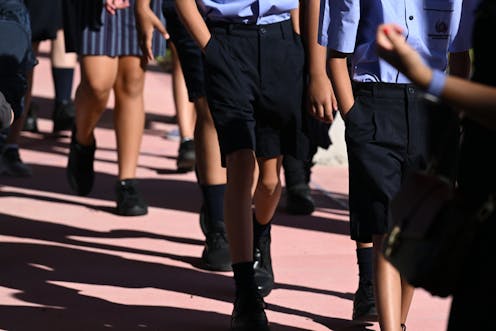Source: The Conversation (Au and NZ) – By Liam Elphick, Lecturer, Faculty of Law, Monash University

Dean Lewins/AAP
In 2018, Australians were shocked to learn that religious schools still had the right to discriminate against LGBTQ students and staff.
Politicians called it “utter crap”. Polling found 74% of Australians opposed it.
Federally, both the then-Coalition government and Labor opposition committed to protect LGBTQ students from discrimination. Yet, almost five years later, laws allowing religious schools to expel LGBTQ students and sack LGBTQ staff remain in place.
Late last year, Attorney-General Mark Dreyfus asked the Australian Law Reform Commission (ALRC) to inquire into how to end discrimination against LGBTQ students and staff while allowing religious schools to build and maintain their communities of faith.
Last month, the ALRC released its consultation paper. It recommended the exceptions in federal discrimination law allowing religious schools to discriminate be removed.
In response, some faith leaders and commentators have argued the ALRC proposals threaten the future of religious education, represent a “fundamental attack” on religious freedom, and would be “catastrophic” for religious schools.
This is entirely untrue.
The ALRC proposals are sensible, clear and necessary. They cut through the noise that has surrounded these issues for many years. They appropriately protect both the rights of LGBTQ kids and teachers to be treated with dignity and respect, and of religious schools to maintain their connection to faith.
There are still some improvements that can be made. But this is our best opportunity to ensure federal discrimination laws finally catch up with contemporary values.
Read more:
Schools can still expel LGBTQ+ kids. The Religious Discrimination Bill only makes it worse
What are the ALRC proposals?
At the federal level in Australia, exceptions for religious schools have always existed.
Currently, the Sex Discrimination Act allows religious schools to discriminate on the basis of sex, sexuality, gender identity, marital status, and pregnancy where the discrimination is in “good faith in order to avoid injury to the religious susceptibilities of adherents of that religion or creed”.
This sounds like a complicated test, but it is very easy to satisfy. A religious school simply has to prove there are some members of its religion who would want to keep out, or treat differently, particular students or teachers – such as LGBTQ students or unwed teachers.
The ALRC proposes removing these exceptions. This would, finally, make it unlawful for religious schools to discriminate in this way.

Shutterstock
The ALRC also proposes reforms to ensure religious schools can still build and maintain a community of faith through hiring and termination of staff. These reforms would allow schools to preference staff on the basis of their religion – but not sex, sexuality or gender identity – where religion is a genuine occupational requirement of their role.
Christian schools could hire Christian teachers, Jewish schools could hire Jewish teachers, and Islamic schools could hire Muslim teachers.
Several states and territories, including Tasmania and Victoria, already adopt a similar approach. Not only has the sky not fallen, but religious schools in Australia only seem to be growing.
The ALRC has also proposed that religious schools be granted a right to terminate the employment of staff who actively undermine the “ethos” of the school’s religion, where the termination is proportionate in the circumstances.
Read more:
Australians reject discrimination that is based on religious belief: new research
How would the proposals affect religious schools?
The ALRC proposals would stop religious schools from expelling students or subjecting them to different treatment to their peers because they are gay or transgender. These proposals would also stop a religious school from sacking a teacher because, for instance, they are a single mother or in a relationship outside of marriage.
What the proposals would not do is force religious schools to hire or continue the employment of staff who fail to uphold reasonable and non-discriminatory codes of conduct and behaviour.
All employers, including religious schools, can adopt non-discriminatory codes of conduct – and the vast majority do. Such codes give employers the right to protect the culture and values of their organisation, including religious values and culture. As long as they are reasonable, nothing in the ALRC proposals affects such codes of conduct.
These proposals simply mean that religious schools would be in the same position as other schools and employers. They will be able to protect their organisational culture and values through existing discrimination law mechanisms.
How should the proposals be improved?
As we set out in the Australian Discrimination Law Experts Group’s submission to this inquiry, there are three ways in which the proposals should be improved.
First, because of the complex relationship between the Fair Work Act and federal discrimination laws, some of the ALRC’s proposals regarding the Fair Work Act have unintended consequences.
Certain proposals would actually allow an alternative route – enterprise agreements – through which religious schools could discriminate against LGBTQ staff.
This should be fixed by amending the Sex Discrimination Act to stop it being overridden by Fair Work Act enterprise agreements, and fixing the legal language in the ALRC’s Fair Work Act proposals.
Second, the ALRC has proposed that school curriculums should be entirely exempt from the Sex Discrimination Act. This undermines one of the purposes of the inquiry: to stop LGBTQ kids from being discriminated against at religious schools.
Instead of directly excluding them, schools and teachers could instead use the cloak of the “curriculum” to vilify and discriminate against students on the basis of their sexuality or gender identity.
It is difficult to see how this proposal is consistent with the duty of care owed by schools to students. It is also unclear how such a proposal would operate in conjunction with the development and implementation of the national curriculum. It should be rejected.
Third, the terms “ethos” and “religious ethos” are used throughout the ALRC’s proposals.
The term “ethos” has never been used in any of Australia’s 13 federal, state or territory discrimination laws. Nor is it found in the international human rights treaties on which those laws rely.
Importing the concept of an institution having an “ethos” is unnecessary and confounding. References to “ethos” should be removed.
These three proposals undermine the value of the ALRC’s otherwise sensible proposals. They give rise to confusion and legal complexity. Fixing them will ensure the great promise of the ALRC inquiry is fulfilled.
School is not just about learning maths and English. It is the place young people learn some of their most important formative lessons about their individual worth and the worth of their peers.
Religious schools can build and maintain a community of faith without discriminating against LGBTQ students and staff – indeed, many already do. It is well and truly time for the law to reflect that.
![]()
Liam Elphick is affiliated with the Victorian Pride Lobby, an organisation that works toward equality and social justice for the Victorian LGBTIQA+ community.
Robin Banks is affiliated with Outside the Box / Earth Arts Rights, and A Fairer World, both not-for-profit groups that work to promote human rights and social justice, and the inclusion of all people in the full range of societal opportunities.
Alice Taylor does not work for, consult, own shares in or receive funding from any company or organisation that would benefit from this article, and has disclosed no relevant affiliations beyond their academic appointment.
– ref. Religious schools can build a community of faith without discriminating. The law should reflect that – https://theconversation.com/religious-schools-can-build-a-community-of-faith-without-discriminating-the-law-should-reflect-that-200532






